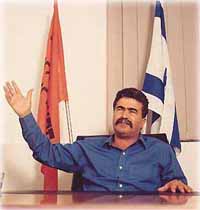Hamas fires rocket salvo at Israel after deadly day of Gaza infighting
Hamas militants unleashed a barrage of rockets at an Israeli town after a brutal day of factional fighting with Fatah rivals in Gaza that killed 15 people, confining terrified residents to their homes and raising the specter of Israel being dragged into the bloody conflict.

Renewed clashes erupted early Wednesday in Gaza City, as Hamas gunmen stormed the home of a top Fatah official, killing five of this bodyguards inside, Palestinians security officials said.
The gunmen fired mortars at the house of Fatah security chief Rashid Abu Shbak before storming it, planting pipe bombs and executing those inside, the officials said.
Witnesses reported seeing heavy smoke rising from the home of Abu Shbak. He and his family were not home at the time of the attack, but at least a dozen of his bodyguards occupied the house. Preventive security forces, which Abu Shbak used to head, were sent in for reinforcement.
Abdel Hakim Awad, a Fatah spokesman, angrily accused Hamas' leadership of the attack on Abu Shbak's house.
"All (Hamas) are killers from top to bottom, all are implicated," he said. "What is happening is killing in cold blood, and this is criminal."
He said Abu Shbak's home was destroyed and burned, and his guards executed.
Tuesday's rocket salvo on the town of Sderot, just outside Gaza, wounded 17 Israelis, one seriously - a woman whose house took a direct hit. Ambulances raced back and forth across the battered town, picking up casualties. Residents counted more than 20 rockets.
It was the first time in three weeks that Hamas, which runs the Palestinian government alongside Fatah, claimed responsibility for firing rockets at Israel. Hamas officials said the barrage was retaliation for an Israeli attack at an Israel-Gaza crossing point earlier Tuesday, an apparent effort to draw Israel into the fray.
Israeli Defense Minister Amir Peretz summoned army commanders for late-night consultations to consider Israel's next move. In a low-key first response to the rocket barrage, Israeli aircraft fired missiles into open areas of northern Gaza, the military said. No one was hurt.
Israel was a minor player in the attack at the crossing, firing at Hamas militants as they carried out the most brutal of this week's fighting. Hamas gunmen riddled a Fatah police jeep with gunfire at close range, killing eight policemen guarding the Palestinian side of the Karni cargo terminal, the only entry and exit point for Gaza goods.
That set off a day full of street battles and casualties. Gunmen in black ski masks controlled the streets and terrified residents huddled in their homes.
An Egyptian mediator said a truce was reached late Tuesday - the third in as many nights. The others have collapsed within hours.
Around midnight, a car carrying Egyptian officials with Hamas and Fatah representatives came under fire, Hamas officials said, and an Egyptian diplomat was slightly wounded.
Late Tuesday, a 10-year-old girl was caught in the crossfire and critically wounded by a gunshot to the head, Palestinian rescue workers said.
After the morning attack, Israel closed Karni, the only route for cargo into Gaza. The closure means Gaza will soon run out of fuel for its power plant and electricity to most of the strip could be shut down by Wednesday morning, said Abdel Karim Abdeen, head of the Palestinian Energy Authority.
Gaza's turmoil further weakened hopes for a resumption of Israeli-Palestinian peace talks, despite a new push by the Arab world to bring the sides to the table, based on an offer of Arab recognition of Israel in exchange for an Israeli withdrawal from all lands it occupied in the 1967 Mideast War.
Israel has expressed reservations, but Israeli Prime Minister Ehud Olmert told Jordan's King Abdullah in a meeting in Jordan on Tuesday that he's ready to meet with Arab leaders in Israel or anywhere else to talk about the idea. Abdullah, in turn, asked Olmert to set a timetable for reaching a peace deal.
Negotiations, however, are inconceivable if the Palestinians descend into a civil war.
This week's fighting was the worst since Hamas and Fatah agreed in February to share power. In all, 23 people have been killed and dozens wounded in three days of street clashes.
The current round of fighting had many of the elements of previous Hamas-Fatah clashes: combatants kidnapped scores of rivals, set up roadblocks to search cars, took over rooftops of high-rises and often fired randomly in crowded residential areas.
Around Abbas' seaside compound in Gaza City, security forces loyal to the president searched cars, asking drivers to open trunks and inspecting ID cards of motorists. They gave those with beards - a possible sign of Hamas support - an extra close look.
At the core of the fighting is the unresolved power struggle between Hamas, which won parliament elections last year, and Abbas' Fatah, which dominated Palestinian politics for four decades. After a year in power and squeezed by an international aid boycott, Hamas realized it cannot govern alone and brought Fatah into the government. But the two sides never worked out all their differences, particularly control over security.
Subscribe to Pravda.Ru Telegram channel, Facebook, RSS!





